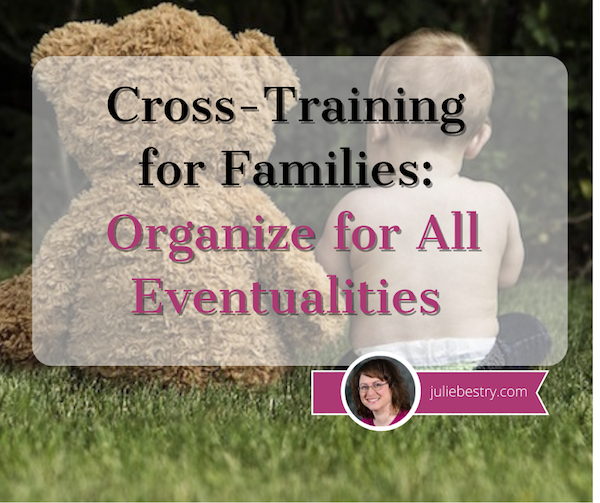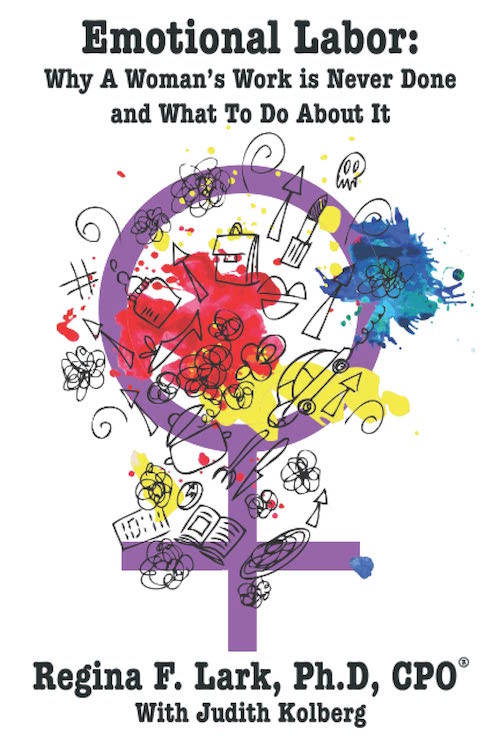Cross-Training for Families: Organize for All Eventualities

WHAT’S THE DEAL WITH CROSS-TRAINING?
The term cross-training appears to have originated in the fitness and athletic world. One’s usual sport strengthens certain muscle groups and develops a specific set of skills; training in different disciplines, allows you to address other muscle groups, gain and sharpen different skills, and create a more well-rounded overall performance.

Photo by Marta Wave from Pexels
Cross-training in business yields the same kinds of benefits. Let’s say you work for a widget-making company. (“Hi! I’m <insert you name here>. I work for a widget-making company!”) Your job might be to oversee the complicated machine that cuts out the widgets; your friend down the factory line has a complementary job, making sure that the widgets are quality-controlled to meet international widget-production specifications.
If your company is run smoothly, each employee must be crackerjack at his or her job. But what if there’s only one person who knows how to do a specific thing? What if that person wins the lottery and quits, or gets hired away by a competing widget maker? Sure, the company can hire and train a new widget quality-control specialist, but until that happens, a manager with prior experience might have to step in, reducing the time the manager can, well, manage.
But what if the staff were cross-trained so that in addition to knowing your own job up, down, and sideways, everyone had at least a little training at other people’s jobs? Wouldn’t that make things better?
When I worked in television, I was a program director at local network affiliates. My assistant and I each had our separate spheres of influence, but the truth was that on most days, I was handling managerial tasks (research, contract negotiation, meetings with syndicators, etc.) and my assistant was handling day-to-day operations (maintaining the film vault, overseeing satellite operations, quality-controlling programming tapes — because this was in ancient times, before programming all lived inside computers).
Ours was a two-person department; without cross-training on the intricacies of satellite operations and whatnot, my assistant would never have been able to call in sick, take a vacation, or move onward professionally without things grinding to a stand-still. Cross-training saves butts!

Photo by Christina Morillo from Pexels
Major advantages of cross-training in business include:
- Better efficiency, because the more people have a good handle on how to do any one thing, the better it will get done.
- Improved flexibility, because the organization as a whole can be nimble.
- Clarity for emergency response planning. Back-up plans can save companies and that can save lives.
- Better “coverage,” so that if there are greater needs in one area (like greater demand for boxing up widgets) employees from other departments can fill those roles.
- Better integration and institutional knowledge across the company. If you only know how your department works, and are fuzzy on the operations of the rest of the business, not only does it hold you back from spotting potential problems and making suggestions (for the company’s benefit), it keeps you from achieving personal growth by seeing what other possibilities exist for you.
- Better morale. The more you know how to do, and the better you are at it, the more self-confidence you’re going to have.
- More satisfied customers. If you are involved in client/customer-facing work, cross-training means you can respond wisely, deftly, and quickly to questions, yielding more confidence in the company and in you as an expert.
Cross-training in your family, especially with regard to essential paperwork, information, and rituals, has the same benefits. Think about what happens when one parent is the main caregiver for a child but has to leave for a business trip or to help an ailing grandparent. The other parent (or other adult in the household, if there is one) needs to step in and step up!
Cross-training in the family has the same benefits as with companies.
- Better efficiency, because the person who usually pays the electric bill, does the carpool drop-off, or renews the car insurance policies may not always be available without difficulty or overwhelm.
- Improved flexibility, because the family as a whole can be nimble.
- Clarity for emergency response planning. You back up your computer; shouldn’t you have backup for when you’re headed to give a career-defining speech and the school calls to say your child just threw up?
- Better “coverage,” so that when one adult in the family is overloaded, the other can pick up the slack without having to explain what to do, how to do it, what the pitfalls may be, and who may complain (about the color of the frosting or how the sandwich is cut).
- Better integration and “institutional” knowledge across the family. It’s not 1957; it’s unreasonable to expect that one member of the household is “in charge” of all things related to the kids or that one (other, or the same) person is “in charge” of all financial, legal, and organizational goings-on.*
*This is a really complex topic. Being a caregiver for children and running a household, even when one works outside the home for pay, involves not only the physical labor but the mental load and emotional labor of anticipating cognitive, emotional, and other needs of stakeholders (but instead of CEOs and shareholders, it’s tiny humans and life partners). I’m excited to note that my colleagues Regina Lark, PhD and Judith Kolberg have written Emotional Labor: Why A Woman’s Work Is Never Done. It was just released, and deals more specifically with this concept.

- Better morale. It’s a reality. The more active a part of your family you are (or your partner is), knowing everything from which lullaby scares away the monsters to which color notebook into which the teacher requires permission slips be inserted, the happier everyone will be.
- More satisfied “customers.” OK, your kids and your spouse/partner, and maybe even other members of your household (like aging parents) want to feel confident that you’re a full-fledged member of the family, that you know what you’re doing and that you want to be there doing it.
Cross-training rocks!
SO WHY DO PEOPLE AVOID CROSS-TRAINING?
If cross-training is so great, why do people groan and avoid it? (I’m so glad you asked!) The sticking points are the same at work as they are at home, though they are expressed differently.
Inertia
At work: businesses tend to focus on urgent priorities, so even if there are directives from on-high requiring quarterly cross-training sessions, management often finds a way to avoid taking time away from meeting deadlines to carve out slots in the schedule for cross-training.
At home: same deal. Your life is busy. Maybe you read a blog post like this, or your professional organizer calls your attention to a problem waiting to happen.

Baby & Teddy Bear Image by StockSnap from Pixabay
Or you hear a horror story about spouse who went on a business trip and the at-home parent couldn’t find the right sleeping stuffie, and so the child cried for two days straight. Or you hear about a widowed friend of your parents who didn’t pay the insurance bill because they didn’t know it came to the deceased spouse’s email address, not via mail. These are cautionary tales.
Focusing on the benefits rather than the inconvenience will help everyone acclimate.
Learning curve on new material
At home and at work, nobody gets everything right on the first try. It’s human nature to avoid attempting something if you fear you won’t do it well. In the workplace, Impostor Syndrome may kick in, and an employee may fear attempting something outside the usual skill set, fearing the inability to get it right immediately might lead to firing. And at home, someone might feel nervous about being slow to succeed at a task one’s partner already does well.
When you invite your partner to join in household cross-training, acknowledge that you have different skill-sets and you may not be equally adept at everything. The point at home isn’t to be perfect, it’s to be perfectly satisfactory as a back-up.
Job security
At work: If you’re the only one who knows how to do something, you may feel like you have job security. (Of course, the flip-side of this is that management will tend not to promote you if you’ve convinced them nobody else can master your area.)
At home: While most people aren’t afraid that a spouse will divorce them if they don’t pick up right away on how to use the digital password manager, we all feel a little anxious about being seen without our halos.
Fear of higher expectations, higher workload, and being taken advantage of
At work: It’s a reasonable fear that if you know how to do more, you might be expected to do more. To some extent, this can be a positive thing, allowing you to do your own rendition of “This little light of mine, I’m gonna let it shine!” This is your chance to step up!
But if your workplace tends to be firmly on one side of the continuum, anywhere from moderately dysfunctional to toxic, you’ll want to watch for signs that you’re being taken advantage of, and be prepared to negotiate for better pay and benefits (or depart for greener pastures with your newfound skills).
At home: Unlike in businesses, where capitalism is the basis of everything and mutual loyalty can be a dubious concept, families are based (or should be based) on love, mutual respect, and loyalty. The point of family cross-training is to strengthen the family, for the benefit of everyone!
Focus on how improving skill training and sharing knowledge will support the healthy growth of the partnership and create a financially and emotionally sound foundation for the kids, the parents, and everyone in the family.
AREAS FOR FAMILY CROSS-TRAINING
Your family is unique, so I won’t presume to know everything you should consider when cross-training. However, this list should get you started.
Organize financial paperwork together

Smead All-in-One Financial Planning Organizer
Get clarity on the status quo. Do both partners know the following:
- What household, credit card, and other bills does the family receive?
- What is the frequency of the billing? (Sure, most utility bills come monthly, but your water and sewer bills may be quarterly. Some insurance premiums are paid monthly, others quarterly; car insurance is often paid every six months.)
- When do the bills usually arrive? (The partner regularly paying the bills may have a gut sense of these dates and know there’s something wrong if the Capital One bill doesn’t arrive by the 10th; with the postal service continuing a massive slowdown, the other partner might be in for a shock if the bill arrived days or weeks late.)
- How do the bills arrive? Via U.S. mail on paper? Via email notifications prompting logging in? Are the bills auto-paid?
- How are the bills usually paid? If you were in the hospital and your partner sat down to pay the bills, not knowing that a particular bill is auto-paid could lead to an expensive double-payment.
- What’s the typical amount of each bill? If you don’t have a chat about these things periodically, you or your spouse might not notice an error in billing or a significant jump in costs.
This probably won’t be a one-time cross-training event. Discuss these issues, then consider spending one month with the partner who usually doesn’t handle the bills taking care of things and “reporting” back; alternatively, you can go through the process side-by-side. The key isn’t to micromanage, but to support one another for common financial goals.
Once your kids are tweens/teens, you might want to include them in some aspects of this cross-training so that they understand the complexities of household finance.
For more guidance on organizing financial paperwork, you might want to start with a classic Paper Doll post, Financial Filing—Scrapbooking snapshots of your money’s life.
Know your household computer set-up
Depending on your ages/generations, you and your partner might be a digital immigrant (a person born or brought up before the widespread use of digital technology) or a digital native. If one of you has discomfort with technology, you’ll need patience to approach these topics. If both of you are digital immigrants, consider hiring someone to help walk you through making sure you’re fully trained on how to achieve your computer-related goals.
 Computer security image by TheDigitalWay from Pixabay
Computer security image by TheDigitalWay from Pixabay
- How and where do you keep the essential passwords? It does no good for your partner to be willing to pay the bills if, in an emergency, they can’t log into the credit card or auto loan account.
- Are you happy with your password management system? (Do you HAVE a password management system?) Know where to find all the passwords that allow your household to run smoothly.
- Do you know (and know how to use) your computer backup system? From family photos to your browser’s bookmarks/favorites to all of your documents, everything needs a backup. I recommend a belt-and-suspenders approach, with local back-up to an external hard drive and cloud back-up via one of the popular backup companies. (I use Backblaze.) For more on backup, you might want to read a guest post I wrote for Alexa Bigwarfe’s WritePublishSell.com called 9 Ways to Keep Your Writing Safe.
- What about all your household tech? Do you know your DSL/Cable modem configuration URL (and the user name and password)? What about security settings for your internet router? If you (or your partner, or the internet tech) set up your Wi-Fi password eons ago, would you be able to find it to set up a new device?
Do you know the state of your estate?
From wills to beneficiary lists, from a Power of Attorney for financial decisions to your healthcare proxy, from your advanced care directives to how much (and what kind) of life insurance you have, chances are good that one person in your family took point and the other is only vaguely aware of what’s going on. Or, maybe you haven’t gotten around to squaring any of this away yet?
Either way, start with making sure you’ve both read up on the topics. You can begin with:
How to Replace and Organize 7 Essential Government Documents
How to Create, Organize, and Safeguard 5 Essential Legal and Estate Documents
The Professor and Mary Ann: 8 Other Essential Documents You Need To Create
Nobody ever likes talking about death. But talking about your estate documents, and maybe even working together to create them in the first place, is the first step to knowing that your family is safe and covered in case of the worst eventualities.
Other ways you can cross-train in the family
There’s obviously so much more than financial and legal paperwork and information to consider when cross-training. Your entire family might want to sit-down to brainstorm ideas. Some possibilities:
- Medical issues — Does everyone (or at least every adult) have a working knowledge of what to do in a medical emergency? My friend has Type 1 diabetes, and her 10-year-old has known, from an early age, how to help his mom by fetching a juice box to raise her blood glucose. Kids should know how to make a phone call to 9-1-1 and how to identify themselves, their address, and some basic information to relay about their parents.
- Medical care — Do you and your partner both know the pediatrician’s name and phone number? Where to find the First Aid kit? What medication you and your kids regularly take, so they can convey this in case of an emergency?
- Parenting essentials — This could be a blog post (or a book) all unto itself. From favorite sippy cup to which kids (and the kids’ best friends) have specific dietary requirements and preferences, from the name of the kids’ teachers to how to contact their friends’ parents (in case one of the tiny humans independently decides to get off the bus and go to a friend’s house without informing you), there’s a lot of essential information and skills that go into parenting. The grownups in the house need to share that wealth of information with one another!
- Laundry and household care — Are there sneaky tricks to getting household appliances to work properly? If something in the basement makes a weird, loud teapot-whistle sound, would you know that it was the sump pump having run out of distilled water? Does it do any good if your partner knows that and you don’t? (So much NOPE!)
- Auto care — Does one partner always handle the interactions with the mechanic? Maybe you need to share the knowledge so that you can speak authoritatively when you’re pressed to make a pricey decision.

Photo by MART PRODUCTION from Pexels
HOW TO PROPOSE FAMILY CROSS-TRAINING
You are the expert on how your family and household works. This post is just designed to give you an idea of how you can not merely share the load (and the information) but do it in a way that ensures your family’s immediate and long-term security. Whether the stakeholder is your toddler (who is sobbing that “that’s the wrong bedtime book”) or the finicky garden hose, the mortgage company or your partner’s grandmother, having a complete sense of what gets done — when, where, and most importantly, how — is essential.
I encourage you to share the concepts of this post with your partner. Talk about the benefits: efficiency, flexibility, clarity for emergency response, better coverage when one family member is overloaded, more integrated family “institutional” knowledge, greater morale, and a happier constituency of family members.
But don’t just talk about the benefits. Speak honestly about potential fears and reasons for avoidance (including inertia, worries about learning curves, the sense of “job security” and higher expectations). Ignoring them won’t make them go away, but talking may be just what you need to conquer those challenges and support your family team.
WHAT IF YOU’RE ON YOUR OWN?
I get it; not everyone has a partner. There are a lot of single parents, widows or widowers whose children are “grown and flown,” and just random singletons (like Paper Doll). That doesn’t mean that you’re completely on your own. Think about who you’d call in an emergency. To whom would you reach out if you needed someone to watch your tiny human? Who would you trust to log into your accounts and pay your bills for you?
These may not all be the same person. You may need to do cross-training with a number of someones: your ex, a sibling in another city, a best friend, a professional organizer trained in financial organizing (whom you can find through NAPO and AADMM), an accountant, an attorney, a hoc nanny, and others. The key is to start thinking now:
Who can be you when you can’t be you?




Oh, I love this. When I was suddenly ill a few years ago, I realized that we had divided our family responsibilities all too well.
I made an operations manual for our home, so all the mysterious things I do that nobody else knows I do could still be done. It was a binder that anyone who was helping out could easily use.
Doing it ahead of time would have been way, way better! And now, reading this post, I’m thinking we should update it regularly too. Wonderful post, thank you!
Illness is a huge trigger for recognizing so many things we need to address in our systems! I love operations manuals, and think they have just as much (if not more) potential in family situations as they do at work.
I’ll look forward to hearing how you update it, and then seeing how you blog about the process.
Great post! My husband and I would do the bills together; over the years, I was at home and he was traveling a lot, so I took the task on. Once a month, we would reconnect and share the updates and other tasks that have changed. Spending an hour or two when systems change may seem like a waste of time, but it really isn’t as you mentioned above. When there is an emergency, you will both be grateful that you know what to do and where things are. Thank you for talking about this topic, it is important for others to cross-train family members/coworkers.
I love how you’ve given a real-world example of the importance (and relative ease) of accomplishing financial cross-training in the family. Thanks for sharing!
I do better with this in my business than in my personal life. As a solopreneur, I feel like I know everything. However, at home, my husband and I have done a fair amount of “dividing and conquering.” While it is nice not to have worry about “his” things, I know I need to do better at seeking out understanding of the system. He doesn’t like to talk about stuff like this, so it is a bit of a struggle, but I am trying.
If anything happens to me, I think he’s going to need to hire some people LOL!
I get it, Seana; in some ways, having someone who doesn’t want to deal with it is like not having someone who CAN deal with it. Consider the bottom paragraph; I have a colleague whom I’ve tapped to step in, should it ever be necessary. (I learned that lesson the hard way!)
Julie – thanks for including us in your blog. You’ve got a well-tuned plan of action for all manner of organizing projects and strategies complete with compelling questions and important conversations. Nice work!
I’m excited about the new book, Regina, and I think it’s going to be meaningful to a lot of people! Thanks for reading, and I suspect that cross-training (and getting those who aren’t used to dealing with the mental load and emotional labor to step up) may be one small strategy for moving us forward as a society. One hopes!
I took a part-time job many years ago and worked mostly in the evenings and weekends. My husband had complete responsibility for our kids while I was working. He definitely had a learning curve. The kids were safe and well-loved, but he learned what it’s like to spend hours with two small kids with no other adults and try to get anything else done. He has never since asked me what I did all day.
LOL, Janet, I think that was an excellent lesson in cross-training and appreciating one’s spouse!
Julie, I agree – cross-training for your family is hugely important. Years ago, my husband was traveling back and forth between Asia and the Northeast (where we lived at the time). While he was gone, I was the person in charge of everything. When he was home, he took over the bill paying and finances. It was an interesting mix to say the least. I’m really happy to say that my married son took note. He does the cooking and shopping because his wife doesn’t like that chore. They share childcare, bill paying and the rest of their finances. I’m so happy Regina and Judith wrote this book and can’t wait to read it!
Diane, I’m very happy to hear that your son’s observations helped him create an egalitarian marriage!
I’m sorry, I couldn’t finish reading this post because it brought back terrible memories. In my experience, cross-training (on the job) doesn’t necessarily increase morale. If you are at the top of your paygrade in a senior clerical position and they decide you have to learn to do switchboard, reception, and filing, it basically says that you are not only replaceable, but you’re no better than the unskilled person who was hired last week.
Aw, Janet, I’m sorry you had stress from reading the initial part of the post, and if you’d read further, you’d have seen that I covered the very issue you referenced. Maybe you can go back sometime and read the bulk of it, which is about training one’s spouse/partner so everyone is covered in case of an emergency. Either way, thanks for giving it a try.
Thanks for the encouragement! You’re right, I did miss out on the good stuff and realize there are probably a few things my husband and I need to teach each other.
Cool beans, I’m glad you got something out of it! And I was a corporate (TV) refugee, so I get that the trauma is real! I’ll try to come up with a trigger warning for office-related experiences! Thanks for coming back and trying again!
As a “random singleton” whose family members and close friends are, um, not especially tech-savvy, or adept in financial, social media, or genealogy matters (to name a few things that are important to me), I have thought about who could help with these things, if necessary. I started by assigning a “genealogy executor” (a role I invented), and have left money in my will to pay for her services. I know who my website executor will be, but haven’t yet asked (she won’t be surprised, though). I think my brother can handle my finances, but can he successfully navigate LastPass if he is not a LastPass user (despite my best efforts)? I love it, but it can be quirky sometimes.
As for families, I have always been a fan of the weekly family meeting concept. Comparing schedules, planning for the week ahead, discussing what’s working and not working in a setting where everyone’s “present”, expecting it, and open to it. Seems like a good time to work in a bit of “cross-training”.
Family meetings are a great idea for the time issues; they could *maybe* be used for handing the paperwork issues, too, but often that amount of time is better broken into smaller blocks. Either way, you’re right, that’s an idea time for broaching the cross-training concept.
And I, too, have isolated the person who’d be responsible if I needed an outside source to handle closing up my business and financial issues; it’s the person to whom I gave my financial Power of Attorney.
Hazel, I love the way your mind works and what you’re doing. That’s brilliant!
Great post, as always super thorough and full of great information.
Medical cross-training for families is so crucial!
This concept of cross-training in families not only will make things function better, but add another level of closeness. It might seem silly to bond over bills, but the more you know about your partner and family, the closer you’ll feel. What a great idea!
Thanks for talking about the actual bonding experience, Katherine; that’s not something I’d considered as a relationship issue, per se, and it’s an excellent point!